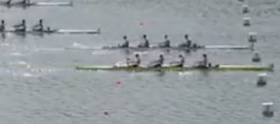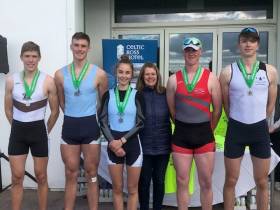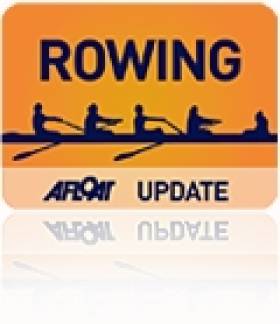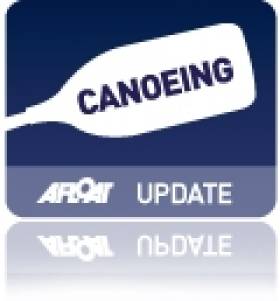Displaying items by tag: European Junior Championships
Silver in Thriller For Ireland at European Junior Rowing
#Rowing: Ireland took a silver medal in Essen this morning at the European Junior Championships. Germany held on as Ireland mounted a sprint finish which might have taken gold – it fell short by .3 of a second.
The Ireland coxed four of Matt Gallagher, James O’Donovan, Jack Dorney, John Kearney and cox Leah O’Regan won their heat ahead of Germany, who took the race to them this time. The hosts led through most of the 2,000 metres, but could not get more than half a length ahead of the Irish.
Turkey came through for bronze, ahead of Russia.
European Junior Championships, Essen, Germany (Day Two, Irish interest)
Men Junior Four, coxed – A Final: 1 Germany 6:19.88, 2 Ireland (M Gallagher, J O’Donovan, J Dorney, J Kearney; cox: L O’Regan) 6:20.18, 3 Turkey 6:22.12.
Ireland Win Heat at European Junior Rowing Championships
#Rowing: Ireland’s coxed four had the perfect start to their challenge at the European Junior Championships in Essen in Germany. The crew of Matt Gallagher, James O’Donovan, Jack Dorney, John Kearney and cox Leah O’Regan won their heat to secure direct qualification for the A Final. In good conditions, Germany and Ireland got out in front and held on to the two direct qualification places to the finish line. Ireland, in lane five, extended a marginal lead at halfway to just over a length at the end.
European Junior Championships, Essen, Germany, Day One (Irish interest)
Men
Junior Four, coxed (First two directly to A Final; rest to Repechage): 1 Ireland (M Gallagher, J O’Donovan, J Dorney, J Kearney; cox: S O’Regan) 6:31.68, 2 Germany 6:35.47; 3 Ukraine 6:37.33.
Two Ireland Crews for European Junior Championships
#ROWING: Ireland will send two crews to the European Junior Championships, the men’s quadruple and double sculls. The quad of Colm Hennessey, Eoghan Whittle, Patrick Munnelly and Andrew Goff won gold at last year’s Coupe de la Jeunesse, a European junior tournament, and will again represent Ireland in the Coupe this season. The double of Shane O’Connell and Ronan Byrne did well in recent testing. The European Junior Championships will be held at Racice in the Czech Republic on May 23rd and 24th.
Jegou Shoots Into European Canoe Slalom Semi-Finals
#CANOEING: Ireland’s C1 canoeist Liam Jegou qualified comfortably for the semi-finals of he Canoe Slalom European Junior Championships at Skopje in Macedonia today. Jegou, whose mother is Irish and who was brought up in Ireland before moving to France, finished fifth of the 20 qualifiers after the first two runs. There were some problems with the timing at the event.
Canoe Slalom European Junior and Under-23 Championships, Skopje, Macedonia (Selected Results; Irish interest, unofficial)
C1 Junior Heats (top 20 qualify): 5 L Jegou 117.94 seconds; 27 R Hendrick 134.98.
K1 Junior Heats (top 30 qualify): 36 C Ryan 120.71; 40 O Farrell 127.58; 53 N Hendrick 190.69.
































































